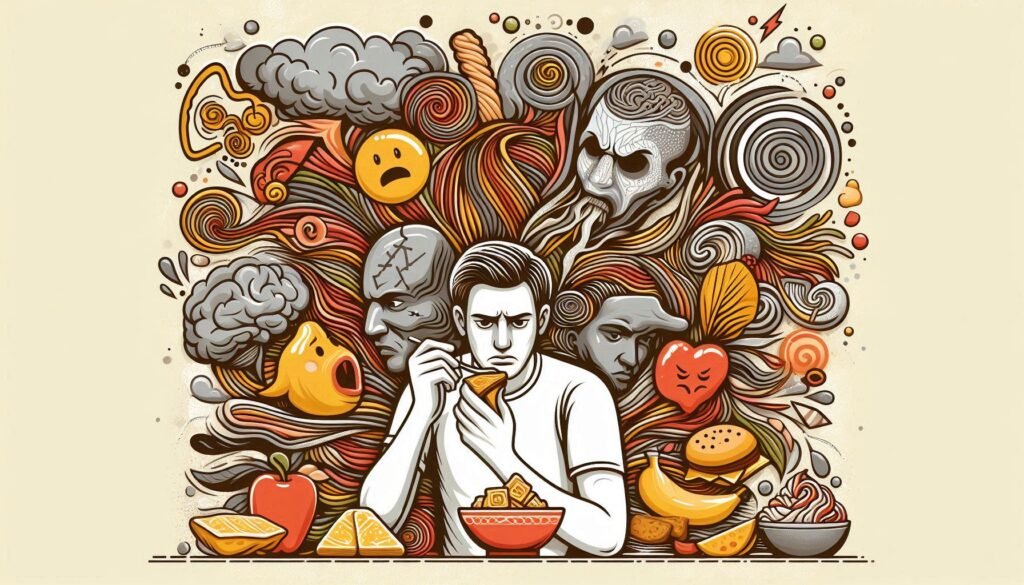Emotional eating is a complex behavior that many individuals experience, often as a way to cope with stress or negative feelings. At the heart of this phenomenon lies neuroticism—a personality trait characterized by emotional instability and heightened sensitivity to stress. When these two elements intertwine, they create powerful dynamics that influence our food choices and eating patterns.
For those who find solace in snacks during tough times, understanding the link between neuroticism and eating habits can shed light on why certain foods bring comfort while others may lead us down an unhealthy path. This exploration delves into how anxious thoughts, mood swings, and self-image issues shape our relationship with food. By gaining insight into these connections, we can begin to develop healthier coping mechanisms for dealing with life’s ups and downs without resorting to that familiar bag of chips or pint of ice cream. Let’s dive deeper into this intriguing subject!

Defining Emotional Eating: The Role of Neuroticism in Food-Mood Relationships
Emotional eating refers to consuming food in response to feelings rather than hunger. It often serves as a coping mechanism for stress, anxiety, and other negative emotions. For many individuals, this behavior becomes a way to seek comfort or distraction from emotional turmoil.
Neuroticism plays a significant role in these food-mood relationships. Individuals high in neurotic traits tend to experience heightened emotional responses and may struggle with anxiety or mood swings. This emotional instability can trigger cravings for high-calorie comfort foods that provide temporary relief but do not address the underlying issues.
Research shows that people with higher levels of neuroticism are more likely to engage in emotional eating behaviors. They often find themselves reaching for snacks during moments of distress instead of recognizing their true needs. The cycle continues as they use food as an escape, reinforcing the connection between their emotions and eating habits.
Understanding this dynamic is crucial for those seeking healthier ways to cope with emotions without turning to food as a source of solace.
Stress-Induced Eating: How Neurotic Traits Influence Coping Through Food
Stress can trigger a primal response in many individuals, and for those with neurotic traits, this often translates into eating. Neuroticism is characterized by heightened emotional sensitivity and vulnerability to stressors. When faced with anxiety or pressure, these individuals may turn to food as a source of comfort.
For them, the act of eating becomes intertwined with their emotional state. It serves not just to satisfy hunger but also to alleviate feelings of distress. This behavior can create a cycle where food temporarily masks negative emotions but ultimately leads to guilt and further stress.
Moreover, neurotic individuals are more prone to perceive situations as threatening. Their tendency toward rumination exacerbates stress levels, prompting them even more towards food for solace. They might find themselves reaching for high-calorie snacks or comfort foods that provide immediate gratification in times of turmoil.
This coping mechanism can lead to unhealthy habits over time. Recognizing the link between neurotic traits and stress-induced eating is crucial for addressing underlying issues related to emotional well-being.
Negative Emotions and Food Choices: Comfort Eating in Neurotic Individuals
Neurotic individuals often experience heightened sensitivity to negative emotions. This emotional turbulence can lead to comfort eating as a coping mechanism. When faced with stress, anxiety, or sadness, these individuals may turn to food for solace.
Comfort foods typically provide immediate gratification and relief from discomfort. High-calorie snacks or sugary treats can momentarily elevate mood by triggering dopamine release in the brain. However, this relief is fleeting and might reinforce unhealthy habits over time.
Studies show that neuroticism correlates strongly with poor dietary choices during emotional downturns. Instead of seeking healthier options, many gravitate toward familiar indulgences that promise comfort but lack nutritional value.
This cycle not only impacts physical health but also exacerbates feelings of guilt and shame post-consumption. As a result, neurotic individuals may find themselves trapped in a loop where they seek happiness through food yet feel worse afterward.
Binge Eating Disorder: The Connection with Neurotic Personality Traits
Binge Eating Disorder (BED) is characterized by recurrent episodes of eating large quantities of food, often accompanied by feelings of loss of control. Research indicates a strong connection between neuroticism and the prevalence of BED. Individuals who score high on neuroticism tend to experience heightened emotional distress, which can trigger binge-eating episodes.
Neurotic traits such as anxiety, depression, and irritability create an environment where food becomes a coping mechanism. These individuals may turn to food for comfort during stressful periods or when faced with negative emotions. The instant gratification that comes from binge eating offers temporary relief but leads to long-term issues.
Moreover, those with neurotic personalities often grapple with self-criticism and low self-esteem. This internal struggle can exacerbate their relationship with food, transforming it into a source of guilt rather than nourishment. As they oscillate between restriction and overeating, the cycle reinforces both poor mental health and unhealthy eating patterns.
Understanding this link is crucial in addressing BED among those exhibiting neurotic traits. It highlights the importance of tailored interventions that consider both psychological well-being and nutritional habits in treatment plans.
Restrictive Eating Patterns: Neuroticism and Controlled Food Intake
Restrictive eating patterns are often linked to neuroticism, where anxiety and emotional distress drive individuals to exert control over their food intake. For those high in neurotic traits, this control becomes a coping mechanism against the chaos of their emotions.
These individuals may feel compelled to adhere strictly to diets or avoid certain foods altogether. This behavior can stem from an underlying fear of weight gain or a desire for perfection, leading them into a cycle of deprivation and guilt.
While restrictive eating might provide temporary relief from emotional turmoil, it can also contribute to unhealthy relationships with food. The focus shifts from nourishment toward stringent rules that govern what is deemed acceptable.
Over time, this pattern can lead not only to physical health issues but also exacerbate mental strain. Understanding how neuroticism influences these restrictive behaviors is crucial in addressing both the psychological factors at play and the impact on overall well-being.
Body Image Concerns: Impact on Eating Behaviors in Neurotic Individuals
Body image concerns significantly influence eating behaviors, especially in neurotic individuals. Those high in neuroticism often experience heightened anxiety and self-doubt regarding their physical appearance. This preoccupation can lead to distorted perceptions of their bodies, triggering unhealthy eating patterns.
Many neurotic individuals resort to restrictive diets or extreme weight control measures as a coping mechanism. They may believe that achieving an ideal body will alleviate their emotional distress. However, this fixation can create a vicious cycle of guilt and shame associated with food choices.
Conversely, some might engage in comfort eating when feeling overwhelmed by negative emotions related to their body image. This behavior offers temporary relief but ultimately reinforces poor self-esteem and unhealthy habits.
The interplay between body image concerns and eating behaviors underscores the need for effective interventions. Addressing these issues is crucial for promoting healthier relationships with food among individuals struggling with neurotic traits.
Mindful Eating Practices: Strategies for Neurotic Emotional Eaters
Mindful eating can be a transformative practice for those struggling with neuroticism and emotional eating. It encourages awareness of hunger cues, cravings, and emotional triggers without judgment. This approach allows individuals to recognize when they eat out of stress or anxiety rather than genuine hunger.
One effective strategy is to slow down during meals. Taking time to chew each bite thoroughly not only enhances enjoyment but also fosters connection between food and feelings. Engaging all senses while eating—savoring aromas, textures, and flavors—can help bring awareness back to the dining experience.
Another technique involves mindfulness meditation before meals. Spending even a few minutes in quiet reflection can ground emotions and diminish impulsive food choices tied to anxiety. Journaling about feelings related to food consumption can also reveal patterns that need addressing.
Creating a designated space for meals free from distractions promotes focus on both the act of eating and one’s internal state. By adopting these mindful practices, neurotic emotional eaters can develop healthier relationships with food over time.
The Social Aspect: How Neuroticism Affects Eating in Social Contexts
Neuroticism significantly impacts how individuals navigate social eating situations. Those high in neurotic traits often experience anxiety and self-doubt, which can lead to discomfort during meals with others. This heightened emotional sensitivity may cause them to overanalyze their food choices or worry about judgment from peers.
In social settings, neurotic individuals might engage in avoidance behaviors. They may skip gatherings altogether due to fears of being scrutinized or feeling out of place. Alternatively, they could resort to eating excessively as a means of coping with their unease. This behavior can create a cycle where negative emotions drive unhealthy choices.
Conversely, some may respond by overly restricting themselves around friends and family. The desire for acceptance can push them towards controlled eating habits that mask their true feelings about food and body image.
Understanding these dynamics is crucial for fostering healthier relationships with both food and peers. Recognizing the influence of neuroticism on social eating allows for better strategies to improve interactions while promoting mindful consumption.
Developing Healthy Coping Mechanisms: Alternatives to Emotional Eating
Developing healthy coping mechanisms is essential for individuals struggling with neuroticism and emotional eating. Instead of reaching for food during stressful moments, consider engaging in physical activity. A brisk walk or a short workout can boost your mood and release endorphins, making it a healthier alternative.
Mindfulness practices also offer significant benefits. Techniques such as meditation or deep breathing exercises can help ground you during overwhelming emotions. These methods promote awareness of feelings without the need for food to mask them.
Another effective strategy is journaling. Writing down thoughts and emotions provides an outlet to process what you’re experiencing. This practice fosters self-reflection, allowing you to identify triggers associated with emotional eating.
Social support plays a crucial role in coping effectively. Sharing experiences with friends or joining support groups creates connections that can alleviate stress without resorting to unhealthy eating habits.
Integrative Treatment Approaches: Combining Nutritional and Psychological Support
Finding a balanced approach to managing neuroticism and eating habits is essential for emotional well-being. Integrative treatment strategies can provide the support individuals need to navigate their unique challenges.
Combining nutritional guidance with psychological care offers a comprehensive pathway toward healthier behaviors. Nutritionists can help clients establish structured meal plans that cater to their individual needs while addressing any underlying issues related to emotional eating. Mindful eating practices can also be introduced, promoting awareness of hunger cues and feelings associated with food choices.
On the psychological side, therapy options like cognitive-behavioral therapy (CBT) have proven effective in helping individuals understand the triggers behind their emotional eating patterns. This type of therapy encourages self-reflection and equips individuals with tools to manage stress without resorting to food as a coping mechanism.
Support groups or workshops focused on both nutrition education and psychological resilience further enhance this integrative approach. By fostering community connections, participants gain insights from shared experiences while working towards personal goals.
This dual focus not only addresses immediate concerns but lays the groundwork for long-term health improvements by cultivating mindful relationships with food and emotions alike.


